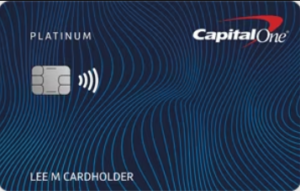Best Credit Cards to Start Building Credit
About Megan
Megan Brame is a five-time award-winning content strategist whose content centers around helping others develop a better understanding of finance and marketing. Her website is https://bramecreative.com
Read full bio
At a Glance
Building credit is an important step for financial success, and one way to do that is by using credit cards responsibly. However, if you’re just starting and have a limited credit history, it can be challenging to get approved for a credit card. Luckily, some credit cards are designed specifically for individuals looking to build credit. Here are our top picks.
In this article, you’ll learn:
Comparing the top credit cards for building credit
| Credit Card | Annual Fee | APR |
|---|---|---|
| Chime Credit Builder Visa® Credit Card | $0 | N/A |
| Discover it® Secured Credit Card | $0 | 28.24% |
| Capital One Platinum Secured Credit Card | $0 | 30.49% |
| Petal® 1 “No Annual Fee” Visa® Credit Card | $0 | 24.25% – 34.74% |
A closer look at the best credit builder cards
Chime Credit Builder Visa® Credit Card
Rewards rate: none
Annual fee: $0
Intro APR: N/A
Regular APR: N/A
Signup bonus: None
Our verdict: The Credit Builder Visa from Chime is relatively bare bones but in a good way. It has no annual fee, charges no interest, and doesn’t require a credit check. Plus, it doesn’t use a traditional deposit to back your credit line. Instead, it uses the balance available in a linked Chime account to determine how much credit you have.
Pros:
- No credit check.
- No annual fee.
- No interest charges.
Cons:
- No rewards.
- No signup bonus.
- Must be a Chime customer.
Apply now: Chime Credit Builder Visa® Credit Card
Discover it® Secured Credit Card
Rewards rate: 2% cash back at gas stations and restaurants.
1% cash back on all other purchases.
Annual fee: $0
Intro APR: 10.99% intro APR on Balance Transfers for 6 months.
Regular APR: 28.24% Variable.
Signup bonus: None
Our verdict: One of the rare secured cards to offer cash back rewards, the Discover it Secured card is a great tool for building credit and getting a few perks. Plus, responsible cardholders will find it doesn’t take that long before Discover will offer you the option of converting your card to one of their regular, unsecured credit cards which offer more perks and benefits without the need for a security deposit.
Pros:
- No annual fee.
- Balance transfer signup offer.
- Offers rewards.
- Can be upgraded to a regular Discover card.
Cons:
- No rewards rate.
- Requires minimum $200 deposit.
Apply now: Discover it® Secured Credit Card
Capital One Platinum Secured Credit Card
Rewards rate: none
Annual fee: $0
Intro APR: N/A
Regular APR: 30.49% Variable
Signup bonus: None
Our verdict: Most secured cards will require a deposit that’s at least a few hundred dollars, but Capital One’s secured card can be opened with as little as $49 (depending on your eligibility).
Pros:
- Potentially low startup deposit.
- No annual fee.
Cons:
- No signup bonus.
- No rewards rate.
- High-interest rate.
- Requires deposit.
Apply now: Capital One Platinum Secured Credit Card
Petal® 1 “No Annual Fee” Visa® Credit Card
Rewards rate: 10% cash back at select merchants
Annual fee: $0
Intro APR: N/A
Regular APR: 25.24%-34.74% Variable
Signup bonus: None
Our verdict: Petal’s 1 “Family” card works a little differently than typical secured cards because it analyzes your banking history instead of just your credit score, making it easier for those who are new to, or have had difficulty getting, credit to start building a solid history.
Pros:
- No annual fee.
- 10% cash back at select merchants.
- Using banking history to determine creditworthiness.
Cons:
- No signup bonus.
- No ability to change your due date.
- High-interest rate.
Apply now: Petal® 1 “No Annual Fee” Visa® Credit Card
What to look for in a credit card for building credit?
When looking for a credit card to start building credit, there are a few key features to consider:
- Secured vs. Unsecured: Secured credit cards require a security deposit, which typically becomes your credit limit. This can be a great option for individuals with no credit or a low credit score. Unsecured credit cards do not require a deposit but may have higher interest rates or fees.
Learn more: Secured vs. Unsecured Credit Card - Low fees: Look for credit cards with minimal fees, such as annual fees or monthly maintenance fees. These fees can eat into your available credit and make it harder to manage your finances.
- Credit limit increases: Choose a credit card that offers the opportunity for credit limit increases over time. This can help improve your credit utilization ratio, a factor that affects your credit score.
- Reporting to credit bureaus: Ensure that the credit card you choose reports your payment history to major credit bureaus. Regularly making on-time payments will help to build a positive credit history.
- Rewards and perks: While not essential, some credit cards for building credit offer rewards or perks such as cashback, points, or discounts. These can be a nice bonus as you build your credit.
How to use a credit card to build credit?
Using a credit card responsibly is the key to building credit. Here are some tips on how to do so:
- Make on-time payments: Pay your credit card bill in full and on time every month. Late payments can negatively impact your credit score.
- Keep your credit utilization low: Aim to use only a small percentage of your available credit. Experts recommend keeping your utilization below 30%.
- Avoid carrying a balance: While it’s important to use your credit card regularly, try to pay off the balance in full each month. Carrying a balance can result in high-interest charges.
- Monitor your credit: Regularly check your credit report to ensure all information is accurate. You can request a free credit report once a year from each of the major credit bureaus.
- Limit credit applications: Applying for multiple credit cards or loans within a short period can negatively impact your credit score. Be selective and only apply for credit when necessary.
- Stay within your budget: Use your credit card for necessary expenses and avoid overspending. Creating a budget can help you manage your finances and avoid accumulating unnecessary debt.
Methodology
The methodology used to calculate the best cards for building credit relied on several factors, with the most prominent of those being:
- The required credit score to apply successfully for the card.
- The additional benefits offered by the card beyond rewards.
- The reward rate of the card, if applicable.
- Overall difficulty in securing a credit card with fair credit.
- The history of the card issuer itself.
- Any potential costs associated with owning a credit card.
The product information provided here is based on research conducted up to a specific date and may have changed. For the latest and most accurate information, we recommend you visit the respective card’s website before proceeding.
FAQs
Building credit without a credit card can be challenging, but it’s not impossible. Here are a few strategies to consider: Become an authorized user: If you have a family member or friend with a credit card in good standing, ask them to add you as an authorized user. Their positive payment history will be reported on your credit report, helping you build credit. Get a credit-builder loan: Some financial institutions offer credit-builder loans specifically designed to help individuals build credit. These loans work by holding the loan amount in a savings account while you make regular payments. Once the loan is paid off, you’ll have access to the money and a positive credit history. Use alternative credit reporting services: Some companies, such as Experian Boost or UltraFICO, allow you to include other bill payment history, such as utility bills or rent, in your credit report. This can help establish a credit history without a credit card. Apply for a secured credit card: While it requires a security deposit, a secured credit card can be a good option for building credit. Use the card responsibly by making on-time payments and keeping your credit utilization low. Learn more: How to Build Credit Without a Credit Card? Using a secured credit card responsibly can help raise your credit score over time. The exact amount your score will increase will depend on various factors, such as the rest of your credit history and how you manage your secured credit card. Making on-time payments, keeping your credit utilization low, and avoiding carrying a balance can all contribute to a positive impact on your credit score. It’s important to be patient and consistent in your credit-building efforts. No, debit cards do not build credit. Debit card transactions are not reported to credit bureaus, so they do not have any impact on your credit score or credit history. Credit cards, on the other hand, can help build credit when used responsibly and the payment history is reported to credit bureaus. Learn more: Do Debit Cards Build Credit?













